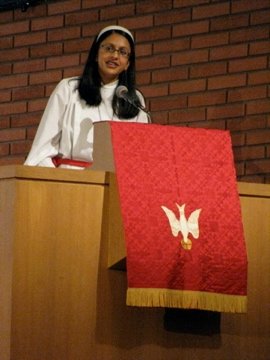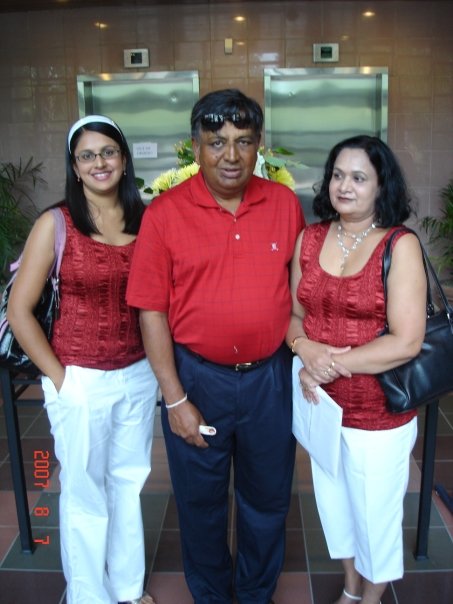The first sermon I ever preached was on citizenship.

The occasion was to recognize the 50th anniversary of the dedication of my home congregation’s sanctuary. The service that day was to look at the past, to see what the people of this part of the Body of Christ came together to build to worship God.
It was also a chance to look at the present; I was asked to preach the sermon to represent the present day as a member of the congregation being sent off to attend seminary at Pacific Lutheran Theological Seminary. The congregation prayed for where God would lead us in the future from the past 50 years onto the next 50.
The Scripture for that occasion came from the dedication service that took place 50 years before. I honed in on Ephesians 2:19-22, which reads:
So then you are no longer strangers and aliens, but you are citizens with the saints and also members of the household of God, built upon the foundation of the apostles and prophets, with Christ Jesus himself as the cornerstone. In him the whole structure is joined together and grows into a holy temple in the Lord; in whom you also are built together spiritually into a dwelling-place for God.

I talked about strangers and aliens. I told two stories; I juxtaposed my parents’ story of being strangers and aliens in a new land with my story of Christian citizenship. With my parents’ story, I focused on my mother. While my father became a naturalized citizen of the United States in 1975 (the soonest he could do so after moving from India in 1970), my mother waited decades.
“I juxtaposed my parents’ story of being strangers and aliens in a new land with my story of Christian citizenship.”
I don’t know if my mom was holding out hope to return to the place she considered to be home or if she maintained her Indian citizenship to hold on to bank accounts and property or if there was another unspoken reason, but she remained an Indian citizen from 1970 to 2007.
She lived as a stranger and an alien in a foreign land for 37 years, yet that foreign land was more a home to her than the country of her birth as time marched on. When my mother became a U.S. citizen nine years ago, she joked that she didn’t grow up in India; she actually grew up in the U.S.
I recognize that my parents moved half a world away from everyone they loved and everything they knew; they were certainly strangers and aliens in a foreign land, and they did everything they could to make sure my brother and I could survive in this strange new land. Part of that survival was assimilation. Sometimes I think I assimilated too well.
“Part of that survival was assimilation. Sometimes I think I assimilated too well.”
My parents raised my brother and me to be “Americans.” Part of being “American” was losing our ties to our family not just by distance, but also by language. My brother has a better handle on Hindi than I do; I can track a conversation, but sadly, I cannot respond in the language of my ancestors and for someone who cares passionately about words and language, I am illiterate. It’s also a tragedy that no one in my immediately family speaks Bengali; that died with my multilingual father who loved to talk to everyone.
My parents were naturalized citizens of the United States. They wanted my brother and me to be proud of being Americans, even if that identity came at the expense of the other identities we held internally and externally.
My brother and I were told that we held two identities, our parents’ homeland of India and the home in which we now resided in the United States, but that we were Americans because that’s who my mother and father raised us to be. During the Gulf War, my dad made sure that the American flag held a place of honor in our home that could be seen by everyone.
When my mother became a naturalized citizen, it was not hard to find red, white, and blue patriotic decorations in the month of August in rural upstate South Carolina when we celebrated with friends and family her new identity as a documented citizen of the United States. But being “American” comes with a history of complications.
“But being ‘American’ comes with a history of complications.”
Part of being “American” was buying into a system of white supremacy. That system is also a system of anti-blackness. It is a system that pits communities of color against one another to ensure that wealthy white male property owners are able to maintain power and privilege in the United States.
I bought into a system that told me that some people were better than others. I was taught discrimination against others, and also against myself. I recall thinking at some point, “Life would be so much easier if I were white.” As an “American,” this is far from the American dream that made my parents move half a world away.
When you’re raised in such a system and are trying to hold together so many identities, saying the situation is “complicated” is the understatement of the year. I feel like I have to relearn and deprogram myself every single day to fight from buying into a system that tells me that people of color have less worth in the land of the free.
This is where my Christian identity comes into play. That first sermon told the story of my mother’s journey from being an Indian citizen to becoming a citizen of the United States. That first sermon I shared my journey from being a Hindu who heard the still, small voice of God in an invitation to a meal. I was yearning to no longer be a stranger and an alien from God.
“I was yearning to no longer be a stranger and an alien from God.”
I shared the story of how I moved from one world to another, and how this new world as a baptized Christian has radically altered and changed my life. That saying “Yes” to God has changed my life, and that means I will respond with a “No” to the things of this world.
Part of my no comes with the story of Colin Kaepernick. This is why I contribute my voice to “Christians for Kaepernick.” When the national anthem states, “O’er the land of the free, and the home of the brave,” I realize that freedom is selective. That freedom is not for everyone. We are seeing this play out before our very eyes with the disregard for the lives of so many people of color, and that the United States does not see that #Blacklivesmatter.
“I realize that freedom is selective. That freedom is not for everyone.”
We are seeing this play out with #NoDAPL, and we see that the United States does not think that #Nativelivesmatter. This is just a small sample of the numerous injustices that happen to people within the borders of the United States, many of them citizens of this country. And there are the numerous injustices that also happens to people within the borders of this country that are not U.S. citizens…
If we are to sing the national anthem, we must look at all of the verses. We must look at the context in which “The Star Spangled Banner” was written, during a time of war. We must look at the entirety of the anthem, especially the third verse that states:
No refuge could save the hireling and slave
From the terror of flight, or the gloom of the grave.
I am tired of buying into a system of empire and oppression. I am tired that “land of the free and home of the brave” is not for everyone.
I’m so tired, I’m going to sit down.
* * *
Tuhina Verma Rasche. Pastoring Lutheran-style in Silicon Valley. (Un)Intended disruptor. Loves/ freaked out by Jesus. Indian-American living life in the hyphen. Find her on Twitter and Medium at @tvrasche, and at thislutheranlife.blogspot.com, where this post originally appeared.












